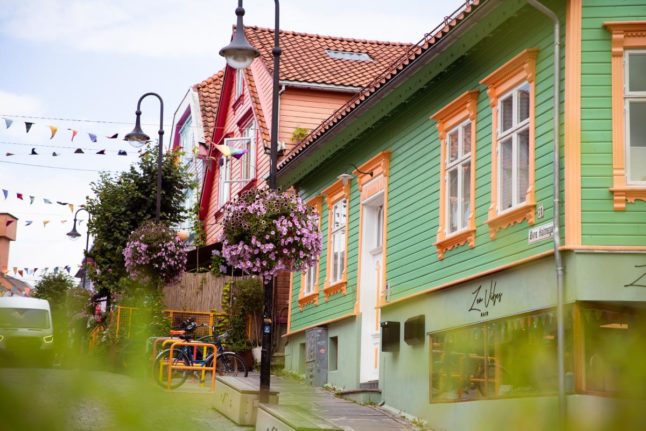If you’re contemplating a move to Norway or are already residing there and eager to become proficient in Norwegian, you might be wondering: How long does it take to learn Norwegian while living in Norway?
The answer, of course, varies widely from person to person and depends on several factors, including your prior experience with the language, the commitment, time, and dedication you plan to put into mastering Norwegian, your environment, and many others.
However, there’s a general timeline that language students can expect if they move to the country and start taking courses.
The road to fluency
Generally speaking, you can expect to reach fluency in 1-2 years – if you attend language courses while living in Norway.
“The average time required to speak the language quite fluently is one year if you opt for our fast-track learning programme. Students in this program start to communicate well in simple situations after two to three months of the course,” Agnes Skjerve of the language school Lingu told The Local.
READ MORE: Why you should learn Norwegian even if you don’t need it for work
“With the slower approach, it can take one and a half to two years. It all depends on the design of the course programme, the student’s language learning predispositions, and the time available to study on a day-to-day basis. There is no shame in taking time to learn, too.
“If anyone tells you that learning a language follows the same path for everyone, don’t listen. You are unique, and the way you learn will also be unique. The tip we can give is to find the course that matches your learning style,” Skjerve said.
Yvonne Møtteberg Karlsen of the Speak Norsk language school pointed out that the time it takes for a new speaker to learn Norwegian with confidence – if they’re living in Norway and taking language courses – varies from person to person.
“It depends on factors such as the person’s age, proficiency in similar languages, memory skills, and many other factors. However, it’s important to note that you need to invest effort and make some social sacrifices to learn the language.
“I would say that if you’re taking a language course, dedicating 2-4 hours every day to practising vocabulary, grammar, and language skills, you’re likely to reach an advanced level in 6-8 months.
“But keep in mind that some people may learn faster, while others may learn more slowly,” Møtteberg Karlsen said.
Tell us how long it took you to learn Norwegian and why. If the survey below does not appear click here.
The benefits of learning Norwegian while living in Norway
Living in Norway provides a unique advantage – constant exposure to the language.
Conversations with locals, television, radio, and daily interactions all contribute to your language acquisition.
“Learning Norwegian while living in Norway provides much better chances of getting the job of your dreams in the Norwegian job market and quicker integration with your work colleagues once you get the job,” Skjerve told The Local.
“It also generally makes the whole integration process in society much smoother,” she said.
“One should also not forget about the administration-related everyday cases becoming easier to handle and how understanding the language really strengthens the understanding of everyday affairs while living here,” Skjerve said.
For Møtteberg Karlsen, faster integration is one of the key benefits of learning Norwegian while living in Norway.
“Although many Norwegians are fluent in English, and it’s possible to live in Norway using only English, you will never fully integrate into Norwegian society without learning the language.
“Learning Norwegian makes it much easier to get to know Norwegians, make Norwegian friends, and truly become a part of Norwegian society.
“Additionally, you’ll be able to better understand cultural aspects, such as Norwegian humour and norms.
“This, in turn, will make Norway feel more like home, a safe and familiar place, rather than an alienated place where you don’t quite belong,” she said.
Challenges language students face
While living in Norway will expedite your path to fluency, you should still expect to encounter the common challenges that most students face when learning the language.
“The biggest challenge students always mention is created by dialects, which seem very scary at first but become easier to handle once the knowledge of Norwegian grows,” Lingu’s Skjerve said.
“Another one is self-confidence and a fear of being judged if you make mistakes. We always tell our students not to worry about it. Practice as much as possible.
READ MORE: ‘Learn the language’: Readers’ tips for a better life in Norway
“For some students, the particular Norwegian vowels can also prove to be a little difficult, as learning to always pronounce Å, Æ and Ø correctly and recognising the unique vowels while listening to the language, can be a little tricky, especially at the start of your learning journey,” Skjerve said.
“Practice makes perfect, so we always encourage students not to give up and just practice,” she said, adding that language learning is about improving communication, not avoiding mistakes.
“On the other hand, as a language school, our job is to help our students pay attention to details because ingrained errors are hard to correct later on. Don’t rush – everyone practices as much as they need and learns at their own pace – it is important to enjoy one’s learning journey as much as possible,” she added.
Speak Norsk’s Møtteberg Karlsen pointed to pronunciation and sentence structure – among others – as notable challenges that language students often face before achieving advanced mastery of Norwegian.
“These challenges will also vary from person to person, but based on my own experience, I’ve noticed that many students struggle with pronunciation, sentence structure, and the inflexion of adjectives.
“These are three areas that differ significantly from most languages, including English. Norwegian includes letters and sounds that don’t exist in other languages, and many words are pronounced quite differently from their written form.
“Additionally, the rules for sentence structure in Norwegian are stricter compared to other languages. For example, most other languages don’t have the V2-rule, whereas in Norwegian, we typically place the verb in the second position.
“Last but not least, we inflect adjectives according to the noun’s gender, number, and definiteness.
“While this is also common in other languages, the rules are different, and there are many to remember,” she said.



 Please whitelist us to continue reading.
Please whitelist us to continue reading.
Member comments